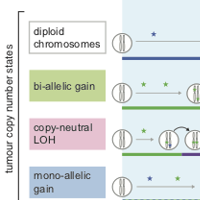Abstract
Cancer develops through a process of somatic evolution. Here, we use whole-genome sequencing of 2,778 tumour samples from 2,658 donors to reconstruct the life history, evolution of mutational processes, and driver mutation sequences of 39 cancer types. The early phases of oncogenesis are driven by point mutations in a small set of driver genes, often including biallelic inactivation of tumour suppressors. Early oncogenesis is also characterised by specific copy number gains, such as trisomy 7 in glioblastoma or isochromosome 17q in medulloblastoma. By contrast, increased genomic instability, a nearly four-fold diversification of driver genes, and an acceleration of point mutation processes are features of later stages. Copy-number alterations often occur in mitotic crises leading to simultaneous gains of multiple chromosomal segments. Timing analysis suggests that driver mutations often precede diagnosis by many years, and in some cases decades, providing a window of opportunity for early cancer detection.
